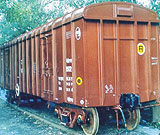|
A
MOTLEY COLLECTION OF BUSINESS AND ECONOMIC NEWS |
|

|
 Government okays FDI in higher education Government okays FDI in higher education
Days after Congress President Sonia Gandhi said that she personally favoured private sector participation in education, a Group of Ministers (GoM) in December cleared a proposed legislation that will allow foreign universities to set up campuses in India.
Once approved by the Cabinet and passed as law, the Foreign Education Providers (Regulation) Bill will grant deemed university status to such institutions. As per the proposal, universities will have to set up campuses on their own and will not be allowed to adopt the franchisee route. Prior approval of the University Grants Commission would be mandatory for such a project and the embassy of the country of its origin would have to certify the antecedents of any institution.
Making the announcement, Commerce Minister Kamal Nath said: “A consensus has been achieved on the ingredients of the Bill. It looks into all aspects of education in India, and the need for quality education. The details, including the foreign direct investment limits, will take a month or so to be finalised. The intent is to create more educational opportunities. A number of safeguards will be incorporated, including government supervision.”
The commerce and the human resource development ministries have been at loggerheads over the role of the private sector in higher education. Gandhi’s remarks were seen as having tilted the scales in favour of reforms.
Earlier this year, the commerce ministry had come out with a 24-page document—Higher Education in India and GATS—supporting FDI in the sector. Commerce Secretary G K Pillai had then said the idea was to evolve a consensus on opening up higher education to foreign investment, even 100 per cent
FDI.
|
|
|
 CCEA clears $1 billion VC funding in realty CCEA clears $1 billion VC funding in realty
The Cabinet Committee on Economic Affairs (CCEA) has approved two real estate venture capital funds which will raise about $1 billion from foreign investors. Both the funds—Urban Infrastructure Opportunities Fund (UIOF) and Peninsula Realty Fund—have already obtained approval from the Foreign Investment Promotion Board (FIPB) to invest in townships, roads, ports and power.
Since the proposed FDI in these funds exceeds Rs 600 crore, they were referred to the CCEA. While Peninsula Realty proposes to bring in $350m, which is approximately Rs 1,596 crore, UIOF is likely to pump in $450m, which translates to Rs 2,300 crore. UIOF has a green-shoe option of Rs 460 crore, which will take the total inflow to Rs 2,484 crore. Both the proposals were supported by the ministry of urban development.
The proposals attract Press Note 2 of ‘05, according to which the capital will have a lock-in period of three years after the completion of minimum capitalisation. As per the FDI rules laid down in PN 2, these projects will have to be completed in five years from the date of obtaining statutory clearances. Even though funds cannot be repatriated before three years, they have an option of going to the FIPB again for any such move. The CCEA also cleared a proposal by international hotel chain Hilton International to enter into a joint venture with DLF. Hilton will hold 26% stake in the proposed JV and will invest Rs 643 crore or $143 million. It has also got the go-ahead for setting up a wholly-owned subsidiary with an investment of Rs 130 crore for the operation and management of hotel business in India. The FIPB had cleared the proposal after putting it on hold initially since the foreign investor did not have a no objection certificate (NOC) from its JV partner, Oberoi Group, with which it has a marketing agreement.
|
|
|
 Mauritius telecom firm lines up $674 million plan Mauritius telecom firm lines up $674 million plan
Independent Mobile Infrastructure Mauritius Ltd, a telecom infrastructure provider, has sought the Foreign Investment Promotion Board’s (FIPB’s) approval for investing up to Rs 3,000 crore ($674 million) in India to tap the rapidly increasing opportunities in the world’s fastest growing telecommunications market. It is the second company after American Tower Corporation to seek permission to enter the telecommunications infrastructure space, an industry projected to be worth about $20 billion by 2010.
At present, India has over 138 million wireless subscribers and is adding over 5 million every month. There are around 10 major telecom companies in the country, including state-owned BSNL and MTNL, apart from private companies like Idea, Hutch and Reliance Communications. The country has 23 telecom circles.
There are over 90,000 cellular towers now and another 200,000 will be needed in the next two years. The FIPB had cleared American Tower’s proposals to set up a wholly-owned subsidiary in India. In an application filed with the FIPB last month, the private company has sought the board’s clearance for the investment, which will be made over 1-5 years. The investment for its foray into Indian telecom infrastructure will be made depending on the capital requirements. Independent Mobile Infrastructure Mauritius Ltd, apart from diluting promoters’ stakes, would also look at issuing shares to raise the capital, it said.
At present, the company has a paid-up share capital of 10,000 shares of Rs 10 each. It was held in the ratio of 99.99 per cent and 0.01 per cent by two individuals, Venkateswarlu and Chandra Padmasri, respectively, the company said in an FIPB filing.
|
|
|
|
|
|
|
 India Inc: India Inc:
The new turnaround specialist on the block
Over the last decade India Inc has proved its mettle on the global stage, not just by zealously acquiring companies but more importantly turning them around. These turnaround stories are making it easier for Indian companies to raise money in international markets, backed by greater credibility and their unique value-creating management expertise, says Ajay Khanna
|
In the short space of the last decade, India Inc conclusively proved its ability to tackle global competition head-on. Now, in the first decade of the 21st century, it is proving its mettle on the global stage by “exporting” its unique value-creating management expertise. And it is doing this not just by zealously acquiring companies overseas but by turning them around as well. This is the real story behind the headlines. Of course, the trend of growing outward foreign direct investment (FDI) is striking. India’s outward FDI has touched $19 billion this calendar year, up from $9.6 billion in 2005. Since 2000, India Inc has made over 300 overseas acquisitions.
One can see a strong vote of confidence in Indian management, with such companies as Tata Tea, Tata Motors, Bharat Forge, Wockhardt, Essel Propack, Continental Engines and a host of others, leveraging their recently-acquired ability to work in challenging business environment. According to a recent study, almost 40 per cent of the top 50 companies have made at least one overseas acquisition in the past three years
Clearly, India Inc’s wanderlust for newer geographies has grown and Indian companies are on a global hunting spree. The Early-bird Among the early birds in India Inc’s “turnaround expert” story is Wockhardt, which acquired loss-making Wallis Laboratories of the UK in 1998 for $8 million and successfully turned it around in a year’s time. At first, Wockhardt thought it best to leave Wallis Labs’ operations in the hands of the European CEO. But it soon realised that it would be more productive to synergise Wallis’ operations with that of its own. The European CEO was replaced with an Indian and Wallis was integrated into the Indian company. Within six months, Wallis had made a turnaround.
This proved a lesson for the Indian pharma company and it used similar approaches while integrating CP Pharmaceuticals of the UK and Esparma GmbH of Germany - the two companies it acquired in July 2003 and May 2004, respectively - with its operations. The Tata Story Similarly, when Tata Tea acquired loss-making Tetley of the UK in 2000, many thought it would be an albatross for the Tatas. But the Tata group proved the Cassandra’s wrong and the company started showing signs of an early turnaround in 2001.
Key to this was a debt restructuring exercise that reduced interest costs. Tata Tea injected £30 million into the Tetley group to replace the high-cost debt. The fact that Tetley’s global retailing operations were complementary to Tata Tea’s domestic business also helped. After the acquisition of Tetley, the Tata group made several significant acquisitions, such as US telecom network operator Tyco Global, Daewoo Commercial Vehicles, and Boston’s Ritz Carlton hotel.Tata Motors acquisition of the commercial vehicles unit of the bankrupt Korean group Daewoo in March 2004 has not only provided the company with an enhanced product portfolio but also allowed it to make a mark in the international market.
The company is now using Korea as a base for commercial vehicle exports to other Asian markets. Rechristened Tata Daewoo Commercial Vehicle Ltd. (TDCV), South Korea, the company is now growing at a healthy rate. In 2005-06, TDCV recorded a 26 per cent growth in turnover, at Rs 1,647 crore against Rs 1,247 crore the previous year. The company’s net profit zoomed 163 per cent to Rs 60.75 crore.
Acquisitions by Indian firms are often made with the intention of getting hold of order-books. Shifting production to India brings about cost economies. For instance, Gurgaon-based auto component maker Continental Engines acquired loss-making European re-manufactured engines firm Vege Motors in June 2005 and turned it around within six months through better cost-control.
These turnaround stories are making a strong case for Indian companies. Those with quality management and strong earnings performance are finding it easier to raise money in the international capital market. Till recently, most transactions by Indian firms were in the $25-100 million range.
Today, Indian companies have achieved financial and integration maturity. They have gained credibility to attract more bank financing. These trends clearly show that Indian companies are fast becoming globally competitive.
|
|
|
 Lafarge to pump in $500 million in India Lafarge to pump in $500 million in India
Lafarge, the world’s largest cement company, is investing over $500 million in India to expand capacities by six million tonnes. In addition, the company is also in talks with Meghalaya and Rajasthan governments to set up two new plants with capacities of three million tonnes each. Bruno Lafont, global CEO, Lafarge said the company expects to complete its six million tonne expansion by 2009, which will take its total capacity in India to 11.5 million tonnes. If the Meghalaya and Rajasthan plants get commissioned, Lafarge’s total capacity could increase to around 18 million tonnes in the next five to seven years.
While Lafarge had entered India by acquiring TISCO’s and Raymond’s cement plants, the company’s current focus is on greenfield expansion in the country. “Our focus is on internal growth rather than acquisitions. Right now our priority is consolidation,” said Lafont.
|
|
 Private investors drive $20 million into Reva Private investors drive $20 million into Reva
Reva Electric Car Company, the $5 million electric car manufacturer, has secured a $20 million private equity investment from Draper Fisher Jurveston (DFJ) and Global Environment Fund (GEF). The investors have got a significant minority interest through this infusion and comes after close to two years since Reva started looking out for funds.
According to officials at Reva, the Mainis, who own the company, have diluted substantially their holdings for this funding to 45 per cent from the earlier 76 per cent. Chetan Maini, who is spearheading this company, however, declined to divulge details of the valuation. Company officials added further that there might be another infusion of around $4 million from Mellon Corp soon.
Reva will use this investment to expand its business by increasing its production capacity, developing newer models and enhancing its international and domestic distribution. The company has thus far sold close to 2,000 of its vehicles and is expecting to sell another 500 by end of the current fiscal.
The company plans to have a new production unit capable of building 30,000 cars per annum by 2010. S.K. Maini, chairman, said, “We are pleased to have received this significant investment from GEF and DFJ and look forward to their experience in helping us to become global leader in the electric vehicle market.”
|
|
 Freight corridors draw global giants Freight corridors draw global giants
India’s proposed Rs 22,000-crore dedicated freight corridor projects on the eastern and western routes have caught the eye of international transport majors. Companies such as Mitsubishi Corporation, Itochu, Bombardier Transportation, Siemens, GE, and Alstom are keen on being a part of the special purpose vehicle for the dedicated freight corridors. Their representatives are in talks with the Ministry of Railways for picking up of a stake in the special purpose vehicle or supply of infrastructure items.
The companies were keen on manufacturing diesel and electric locomotives and wagons, along with signalling communication equipment for the projects, which will be meant exclusively for cargo trains. “We are exploring the option of setting up a manufacturing and maintenance centre for locomotives,” a Mitsubishi Corporation executive said.
The estimated investment for a locomotive manufacturing plant alone is over Rs 10,000 crore. Industry analysts pointed out that Indian Railways would need at least 500-600 electric freight locomotives, besides the same number of diesel locomotives, for the freight corridors in the first phase.
|
|
 Tier-III cities set for rapid growth Tier-III cities set for rapid growth
Tier III cities in India are poised to emerge as one of the most preferred investment destinations for global realty and investment firms and is therefore likely to be transformed over the next three to five years. These locations would include Jaipur, Coimbatore, Ahmedabad and Lucknow.
Availability of the requisite talent pool coupled with low cost real estate, there would be a growing interest in tier III cities from the technology sector players who seek to expand their operations into these previously untapped locations. Based on the current and expected growth potential, various locations in the country can be classified as mature destinations, destinations in transition and emerging destinations. Locations like Mumbai and Delhi can be classified under mature destinations. With their metropolitan character, Mumbai and Delhi have been traditional business destinations and have a favourable track record in attracting investments.
Commercial real estate growth in Mumbai and Delhi is expected to be range-bound and focussed mostly around the suburbs and peripheral locations in the coming years. On the other hand, Bangalore and Gurgaon could be classified under destinations in transition category as they offer a large captive human resource potential, availability of quality real estate and operating cost advantages.
|
|
|
|
|
|
|
|
January 2007
|
|

|
|
|
|